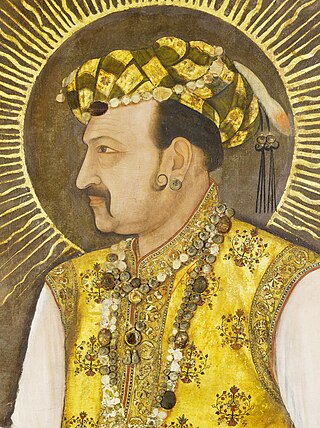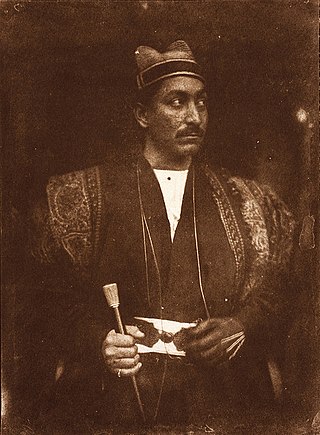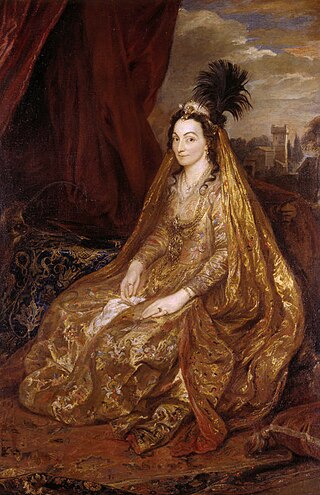Background

"In 1642 he broke out", as Denham's contemporary Edmund Waller remarks of him, "like the Irish Rebellion, threescore thousand strong, when nobody was aware, or in the least suspected it", in the play of the Sophy. [1]
| The Sophy | |
|---|---|
| Written by | Sir John Denham |
| Date premiered | 1641 |
| Genre | Revenge tragedy |
The Sophy is a revenge tragedy in blank verse written by Sir John Denham and first acted in 1641.

"In 1642 he broke out", as Denham's contemporary Edmund Waller remarks of him, "like the Irish Rebellion, threescore thousand strong, when nobody was aware, or in the least suspected it", in the play of the Sophy. [1]
Denham's source is Sir Thomas Herbert's account of the life of Abbas the Great of Persia in Some Yeares Travels into Divers Parts of Asia and Afrique, first published in 1634. [2]
A father suspecting and plotting against a dear and noble son; a son deprived of sight by the command of a father, and meditating in his rage and revenge the murder of his own favourite daughter, because she is beloved by his father; and the deaths of both son and father by poison, administered through means of a courtier who has betrayed both. Such are the main hinges on which the plot of the piece turns. [3]

Nur-ud-Din Muhammad Salim, known by his imperial name Jahangir, was the fourth Mughal emperor, who ruled from 1605 until his death in 1627. He was the third and only surviving son of Akbar and his chief empress, Mariam-uz-Zamani, born to them in the year 1569. He was named after the Indian Sufi saint, Salim Chishti.
This article contains information about the literary events and publications of 1641.

Sir Anthony Shirley (1565–1635) was an English traveller, whose imprisonment in 1603 by King James I caused the English House of Commons to assert one of its privileges—freedom of its members from arrest—in a document known as The Form of Apology and Satisfaction.

Jean Chardin, born Jean-Baptiste Chardin, and also known as Sir John Chardin, was a French jeweller and traveller whose ten-volume book The Travels of Sir John Chardin is regarded as one of the finest works of early Western scholarship on Safavid Iran and the Near East in general.

Sir John Denham FRS was an Anglo-Irish poet and courtier. He served as Surveyor of the King's Works and is buried in Westminster Abbey.

Sir Thomas Herbert, 1st Baronet (1606–1682), was an English traveller, historian and a gentleman of the bedchamber of King Charles I while Charles was in the custody of Parliament.

Mohan Lal Zutshi KLS was an Indian traveler, diplomat, and author. He is credited as being an important player in the so-called Great Game—possibly the first notable Indian one. He also played a central role in the First Anglo-Afghan War of 1838–1842. His biography of Dost Mohammad Khan, the Emir of Afghanistan in Kabul, is a primary source on the war.
Simon II, also known as Svimon or Semayun Khan, was a Persian-appointed king of Kartli, eastern Georgia, from 1619 to 1630/1631.
Constantine I, also known as Constantine Khan, Constantin(e) Mirza, or Konstandil / Kustandil Mirza, of the Bagrationi dynasty, was a king of Kakheti in eastern Georgia from March to October 1605.
The Library Edition of the British Poets was the title given to a 48-volume edition of the works of British poets, published between 1853 and 1860 by James Nichol of Edinburgh, edited, with lives of the authors, critical dissertations and explanatory notes, by the Rev. George Gilfillan. All the poets included were dead by the date of publication, and nearly all were born before 1770. The English Romantic poets were thus omitted from the collection.

Susan Herbert, Countess of Montgomery, was an English court office holder. She served as lady-in-waiting to the queen consort of England and Scotland, Anne of Denmark. She was the youngest daughter of Elizabethan courtier, and poet Edward de Vere, 17th Earl of Oxford.
Sir Dodmore Cotton, was an English diplomat and the first accredited English ambassador to the court of King Abbas I of Persia, appointed by Charles I.

Sir Edward Lewknor or Lewkenor was a prominent member of the puritan gentry in East Anglia in the later Elizabethan period, and an important voice on religious matters in the English Parliament.

Teresa Sampsonia was an Iranian noblewoman of the Safavid Empire of Iran. She was the wife of Elizabethan English adventurer Robert Shirley, whom she accompanied on his travels and embassies across Europe in the name of the Safavid King (Shah) Abbas the Great.
The Circassians in Iran are an ethnic minority in Iran. Circassians in Iran differ somewhat from other Circassian diasporas, in that most in the former stem from the Safavid and Qajar era, although a number migrated as muhajirs in the late 19th century as well. The Circassians in Iran were very influential during periods in the last few centuries. The vast majority of them have assimilated to Persian language, and no sizeable number speaks their native Circassian languages anymore. Once a very large minority in Iran, nowadays due to being heavily assimilated over the course of time and the lack of censuses based on ethnicity, population estimates vary significantly. They are, after the Georgians, the largest Caucasus-derived group in the nation.
Sir Thomas Chaloner was an English courtier and Governor of the Courtly College for the household of Prince Henry, son of James I. He was also responsible for introducing alum manufacturing to England. He was Member of Parliament for St Mawes in 1586 and for Lostwithiel in 1604. His third son was the Regicide Parliamentarian Thomas Chaloner. He is sometimes confused with his cousin Thomas Chaloner, a naturalist who prospected for alum.
Marta was a Georgian princess royal of the Bagrationi dynasty, and a wife of the Safavid Iranian king (shah) Abbas I. She married Abbas I on 20 September 1604. The two divorced in c. 1614.
Dengiz Beg Rumlu was a Turkoman courtier from the Rumlu tribe, who served as merchant-envoy to Habsburg Spain during the reign of Safavid king (shah) Abbas I.
The Mokri tribe is a Kurdish tribe residing in West Azerbaijan Province, Iran. Mokri princes made up the ruling class of the emirate of Mukriyan.